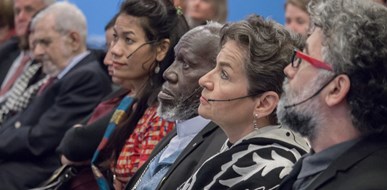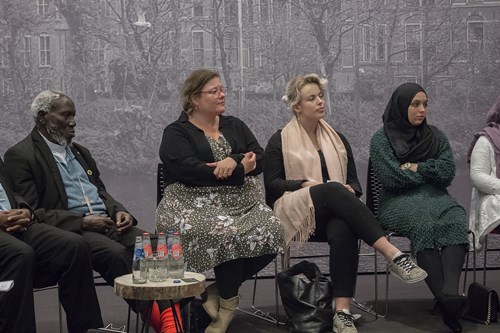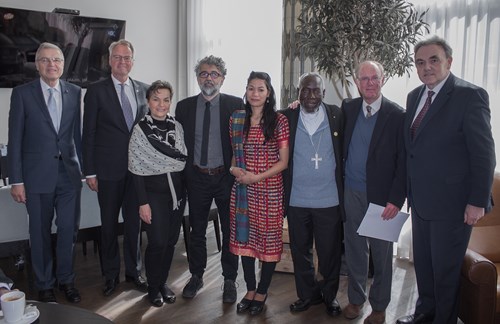Meeting the Four Freedoms Award Laureates in The Hague
Published 6 June 2018
The laureates of the four freedoms awards this year (a diplomat, a journalist, a Bishop, a conservationist, and an ardent human rights activist) are people fighting their battles on different fronts, but they all have one aim in common: to make the world a better place. After receiving their awards in a ceremony that took place on 16th of May in Middelburg, the laureates came together on the 17th of May with young people from various cities and universities in the Netherlands to share their experiences and brainstorm on possible future avenues of cooperation and action.
The event was organized in cooperation with the Roosevelt Foundation, T.M.C. Asser Instituut, Pro-Demos and Leiden University College (The Hague Campus). Han Polman (Chairman of the Roosevelt Foundation) and Prof. Ernst Hirsch Ballin (President of the Board of Asser Institute), kicked off the event with opening speeches, after which the laureates were introduced to the audience.
@TMCAsser President Prof. Ernst Hirsch Ballin provides opening remarks at “Roosevelt in The Hague”, stressing the need to think of human rights and fundamental freedoms not only in selfish terms but also as a collective responsibility. #4FreedomsDH pic.twitter.com/7XXjhq5nlP
— Joris Larik (@JorisLarik) May 17, 2018
The 2018 International Four Freedoms award was given to the Costa Rican diplomat Christiana Figueres for her dedicated work for the realisation of the 2015 Paris Climate Agreement. The award on Freedom of Speech and Expression was given to the Turkish journalist Erol Önderoğlu, who has been working for Reporters Without Borders for more than twenty years. The award on Freedom of Worship was given to Bishop Paride Taban for his life-long efforts to bring peace to the people of South Sudan. The award on Freedom from Want was given to the Belgian conservationist Emmanuel de Merode on behalf of the Virunga Alliance for their efforts to protect the Virunga National Park in Congo. Last but not least, the award on Freedom from Fear was given to Urmila Chaudhary for her struggle to end the Kamlari system of child slavery in Nepal and her fight for the rights of girls, especially for their right to education.
The laureates take the podium to discuss the four freedoms with a full house attending "Roosevelt in the Hague". #4FreedomsDH pic.twitter.com/8XgNS9oABN
— TMC Asser Instituut (@TMCAsser) May 17, 2018
The audience had the opportunity to ask the laureates a few questions in the morning session, followed by a more intimate setting where they had a greater opportunity to engage in a much deeper discussion with them during the five parallel round table meetings that took place in the afternoon.
Participants in the Paris Climate Agreement (the Agreement) round table meeting shared their perspectives on how to address the key challenges presented by climate change and the potential means by which to reach the targets set by the Agreement. Participants acknowledged that only by imagining a future without fossil fuels would we be able to achieve one. The participants also engaged in a lengthy appraisal of the commitments that various actors would need to make in order to curb the threats posed be climate change. This included an apportionment of responsibility and accountability in respect of actors "who have the power", including financial institutions and pension funds, multinational corporations, States and the media, and those actors who have "power in numbers", notably ourselves (as consumers and citizens) and global civil society, among others. In the final analysis, dealing with the threat of climate change is a moral concern: our ability to respond depends on whether we can reinvigorate the notion of the conscience for all actors.
Meanwhile, at the round table on Freedom of Speech and Expression, participants agreed that open public debate is crucial, and it is the only way to bridge existing divisions in society and prevent new divisions from being formed. The only restrictions possible should be for preventing hate speech and calls on violence.
During the Freedom of Worship round table, Bishop Paride Taban elaborated on the success of his Peace Village being founded on listening to the needs of local communities rather than approaching them through a Western framework of thinking; instead of top down change, he proposed engaging the locals in a grassroots movement. He further underscored the need for flexible and sustainable funding, as peace-building is a long-term process rather than a short-term project.
 Bishop Paride Taban and participants during the Freedom of Worship round table discussion
Bishop Paride Taban and participants during the Freedom of Worship round table discussion
The Freedom from Want round table discussion centred on solidarity and eradication of global and national inequality. Besides theoretical discussions on the universality of human rights, the freedom from want, and freedom more generally, the participants proposed multiple action points that each citizen could take up in their daily life to safeguard such freedom, so that every individual could enjoy the fruit of the globalized economy.
At the Freedom of Fear round table, laureate Urmila Chaudhary emphasised that she still has a lot of work to do to change societal perceptions on child labour and child slavery; there are still many more young girls to save.
To wrap up the discussions and bring them to a full circle, the rapporteurs present in the five round table meetings summarized the highlights of the discussion in each in a plenary session, which led to a closing festive reception. To read the summaries of all discussions please click here.

From left to right: Prof. Ernst Hirsch Ballin (President of the Board of Asser Institute), Han Polman (Chairman of the Roosevelt Foundation), Laureate Christiana Figueres, Laureate Erol Önderoğlu, Laureate Urmila Chaudhary, Laureate Bishop Paride Taban, Frans Bouwen (Senior Advisor and Project Coordinator for the Roosevelt Foundation), and Dutch historian, publicist, and expert on American Politics Willem Post.
**Photo Credit: Brian Ruth**
